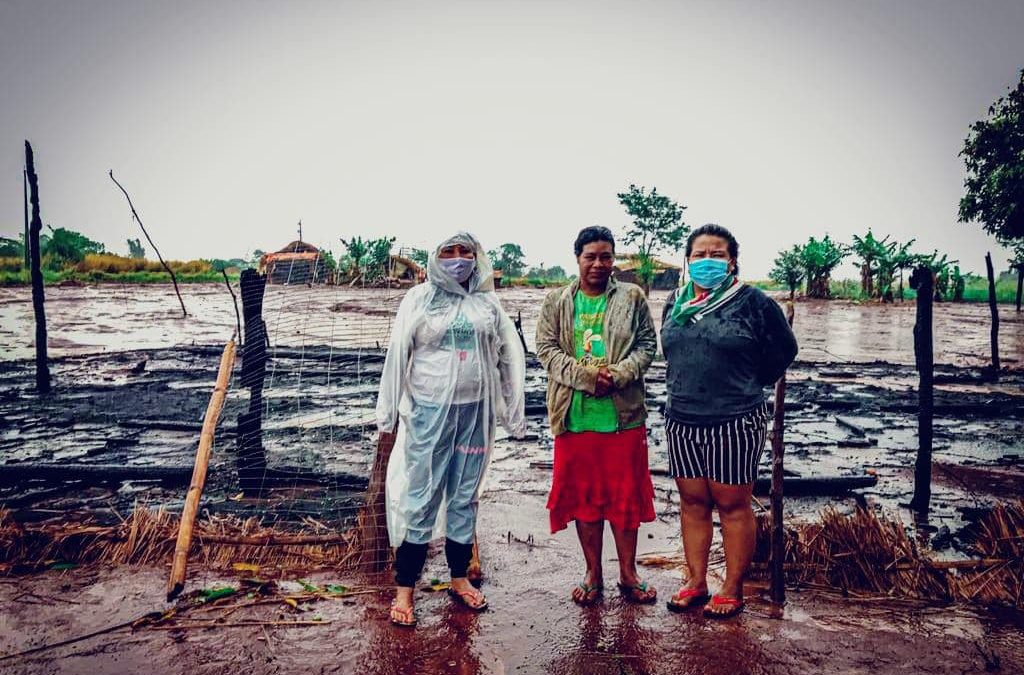
16/Oct/2021
Dear,
A week has passed since the arson of Ogusu Apykay in Amambai/MS, the traditional space that Kunangue Aty Guasu helped to build. Violence continues to rise in the Kaiowá and Guarani territories against women, girls, young people and Nhandesys, such as: harassment, physical and psychological violence and rape. There are many Raissas begging for help (for those who didn’t follow, Raissa, the 11-year-old Kaiowá girl, who was raped and murdered by five men and thrown from a height of 20 meters).
Kunangue Aty Guasu publicly demands action for so many crimes committed in Kaiowá and Guarani territories against our bodies. We call on civil society, state agents, social movements, indigenous leaders, indigenous organizations and heads of churches, to together build necessary measures for prevention, security and referrals of crimes committed in territories related to religious intolerance, religious racism, etc, which it is violating our traditional spaces, ways of organizing, being and existing.
[Encaminhado de Caio Mota]
Our cry for help runs through each letter of this document, sent here by the organization of women, elderly, youth, girls and Nhandesys of Kunangue Aty Guasu – Great Assembly of Kaiowa and Guarani/MS Women, and we ask that you send us confirmation of receipt of this email, and share with their networks.
How many traditional houses have already been burned without any investigation of the crime and how many prayer houses will still be set on fire so that something can be taken? How many bodies will still have to be raped for action to be taken? Until when?
Thursday, October 14, 2021, Kunangue Aty Guasu will launch the campaign via virtual kitty, on our platform kunangue.com, to cover the costs of securing traditional spaces and reforesting areas around prayer houses. With these resources collected, it will be possible to purchase security cameras, install alarms, solar panel, power wiring, wifi network, maintenance of the monthly security cost of OGUSU – CASAS DE REZA – CASAS DE CURA – TRADITIONAL SPACES KAIOWÁ and GUARANI. In November/2021, Kunangue Aty Guasu will resume the construction of four more traditional spaces in Kaiowa and Guarani territories, including: Limão Verde/Amambai-MS, Nhanderu Marangatu/Antonio João/MS, Laranjeira Nhanderu I/Rio Brilhante/MS and Guyra Kamby’i / Douradina/MS.
The collective support of everyone is fundamental, both for the security, construction and maintenance of traditional spaces and also the security of Nhandesys and Nhanderus in times of genocide and epistemicide in our history. Vivas we want to stay, and we will always fight. For as long as there is the sound of mbaraka and takuapu, there will be a fight.
This fight is for all nxs! Come with us!
Yours sincerely,
Advice of the kunangue Aty Guasu
Read the full story: Considerations_from_the_Kuñangue_Aty_Guasu_against_the_patriarchal
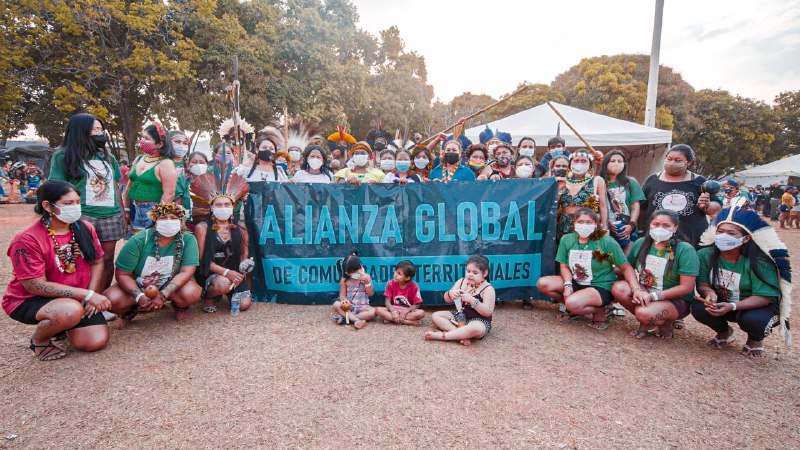
09/Sep/2021
A ancestralidade das guerreiras indígenas de todos os países latino americana é o elo que conecta a luta por suas vidas e por seus territórios
Brasília, 09 de setembro de 2021 – Um grupo de 7 mulheres, originárias de 7 povos da Amazônia Equatoriana vieram a Brasília se somar à Segunda Marcha das Mulheres Indígenas, em uma demonstração de solidariedade e apoio à luta de suas irmãs indígenas do Brasil.
“Viajamos milhares de quilômetros solidárias com nossas irmãs e companheiras brasileiras, pois suas lutas são similares às nossas, pois os Estados republicanos violam sistematicamente nossos direitos como mulheres, com indígenas, como seres humanos”, afirma Lineth Calapucha, vice-presidenta do Povo Kichwa, de Pastaza.
O grupo foi recebido pelas lideranças da Articulação Nacional de Mulheres Indígenas Guerreiras da Ancestralidade, com muita alegria e respeito. “Nós entendemos que nossa irmandade nasce de uma ancestralidade compartilhada, dos tempos em que não havia fronteiras que nos separassem artificialmente, nem projetos genocidas de Estado que roubassem nossas terras e matassem nossos povos”, reforça Braulina Baniwa, da ANMIGA.
Elas participarão das atividades da Segunda Marcha das Mulheres Indígenas, que acontece até sábado, nos campos da FUNARTE, e tem como tema “Reflorestar mentes para a cura da terra”.
Sônia Guajajara, coordenadora executiva da APIB e dirigente da ANMIGA reforça o laço entre as mulheres indígenas do Brasil e da Amazônia: “A Amazônia é nossa casa comum e temos de unir nossas forças para impedir o avanço da ambição, do fogo, dos pastos e das motosserras. A situação é urgente, e por isso estamos aqui e sempre estaremos, juntas e fortes”.
Esta potente articulação de mulheres vem da percepção de que o inimigo que enfrentam é violento e destruidor, mas a força das mulheres indígenas é maior, pois são guerreiras ancestrais que oferecem ao mundo a possibilidade de impedir que a crise climática e ambiental que vivemos se agrave.
O papel das terras indígenas na preservação das florestas na América Latina é reconhecida pela ONU, conforme afirma a FAO no relatório Os povos indígenas e a governança das florestas, publicado em 2021. O relatório afirma que as terras indígenas são os territórios mais bem preservados da região – e as mulheres são agentes fundamentais para este resultado, pois são elas que cuidam mais diretamente e cotidianamente dos territórios.
“Somos mulheres, somos indígenas. Somos mulheres indígenas, mulheres da terra, mulheres curadoras que defendem a vida”, afirma Nina Gualinga, da Organização Mulheres Amazônicas, em uma declaração que resume a força e a diversidade cultural que se reúnem em Brasília.
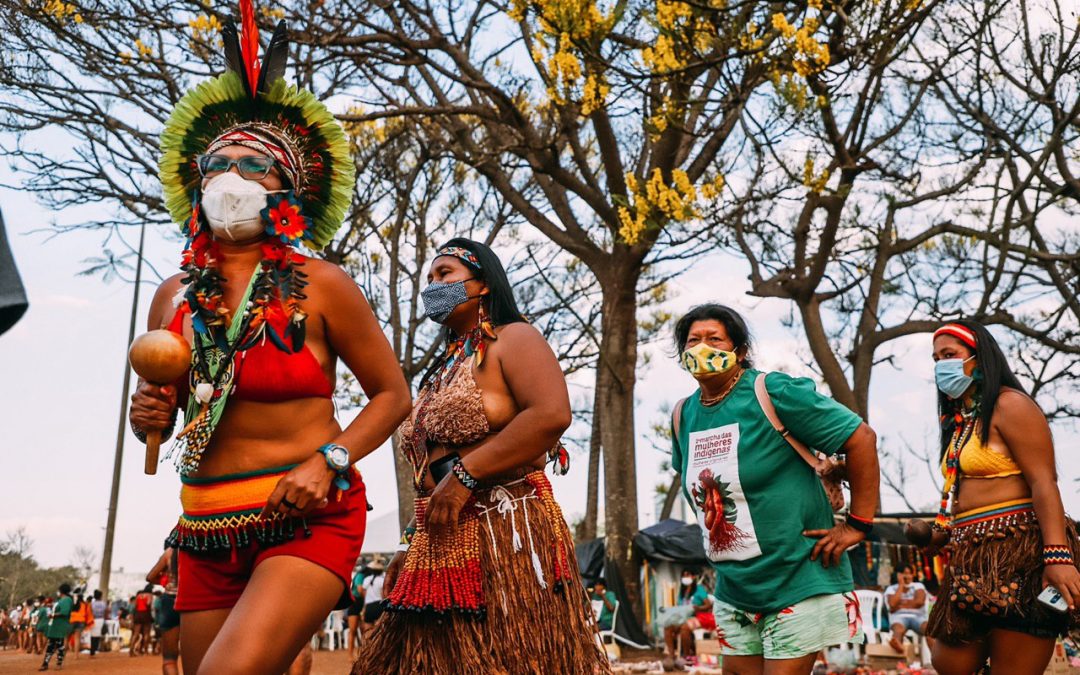
09/Sep/2021
Organização da II Marcha Nacional das Mulheres Indígenas convoca imprensa para pronunciamento oficial da mobilização, em Brasília, hoje (9) às 17h
Por Assessoria de Comunicação da Anmiga
A organização da II Marcha Nacional das Mulheres Indígenas definiu acompanhar o julgamento do marco temporal e realizar, nesta sexta-feira (10), a Marcha que estava prevista para a manhã de hoje, 9 de setembro, na programação do acampamento montado no espaço da Funarte, em Brasília.
As mulheres indígenas estão na linha de frente para enterrar a tese do marco temporal e apoiar as ministras e ministros do Supremo Tribunal Federal (STF) na votação que está em curso desde o dia 26 de agosto e irá definir o futuro de todas as demarcações de terras indígenas no Brasil.
Pela garantia dos territórios, com a força das que as antecederam e na luta para as presentes e futuras gerações, as mais de 5 mil guerreiras da ancestralidade, de 172 povos, seguem acompanhando o julgamento de um telão montado na tenda principal do acampamento da Marcha.
A sessão está prevista para esta quinta-feira, 9, às 14h, com a leitura do voto dos ministros e ministras da Suprema Corte. Iniciando com o voto do ministro Fachin, que agora deve apresentar a parte mais central de sua posição sobre o tema das demarcações de terras indígenas.
Na sequência, votam os outros ministros, do mais novo na casa, ministro Kassio Nunes, até o mais velho, o decano do STF, ministro Gilmar Mendes. Também há a possibilidade de um pedido de vistas por parte de algum ministro, o que resultaria na interrupção e no adiamento da votação.
Julgamento sobre marco temporal
Na pauta de discussões há três semanas, o julgamento tem como um dos principais pontos a discussão sobre a inconstitucionalidade da tese do marco temporal. Na prática, a Corte analisa a reintegração de posse movida pelo governo de Santa Catarina contra o povo Xokleng, referente à Terra Indígena Ibirama-Laklãnõ, onde também vivem os povos Guarani e Kaingang. O caso recebeu, em 2019, status de “repercussão geral”, o que significa que a decisão servirá de diretriz para a gestão federal e todas as instâncias da Justiça no que diz respeito aos procedimentos demarcatórios.
Para as mulheres indígenas guerreiras da ancestralidade, a demarcação dos territórios é uma garantia, também, de segurança para os corpos das mulheres, como sustentou Samara Pataxó, assessora jurídica da Articulação dos Povos Indígenas do Brasil (Apib).
“Esse julgamento, com repercussão geral, que, para além de definir uma tese que irá definir o futuro das demarcações de nossas terras, também decidirá sobre o futuro de nossas vidas e da nossa continuidade existencial enquanto povos originários desse país. Pois não há como falar de terras, construir uma tese sobre terras indígenas, sem considerar a vida dos povos indígenas, e não há como falar de vida, sem a proteção dos nossos territórios.”
Pela garantia de seus direitos originários e contra o marco temporal, defendido por ruralistas e outros setores interessados na exploração das terras indígenas, os povos originários têm se mantido em mobilização permanente para acompanhar o julgamento do STF.
A expectativa é que a Corte rejeite a tese do marco temporal e reafirme o caráter originário dos direitos territoriais dos povos indígenas e a tradicionalidade da ocupação como único critério para as demarcações, conforme previsto na Constituição Federal de 1988. Segundo a tese do indigenato, consagrada na Constituição de 1988 e oposta ao marco temporal, o direito dos povos indígenas à demarcação de suas terras é originário, ou seja, anterior à própria formação do Estado brasileiro, e independe de qualquer marco temporal.
Serviços
O quê: Pronunciamento da II Marcha Nacional das Mulheres Indígenas
Quem: Mulheres indígenas de todos os biomas brasileiros
Organização: Anmiga – Articulação Nacional das Mulheres Indígenas Guerreiras da Ancestralidade
Quando: 9 de setembro, 2021
Horário: 17h, horário de Brasília
Onde: Em Brasília, no acampamento instalado no espaço da Funarte
Programação: https://anmiga.org/marcha-das-mulheres/
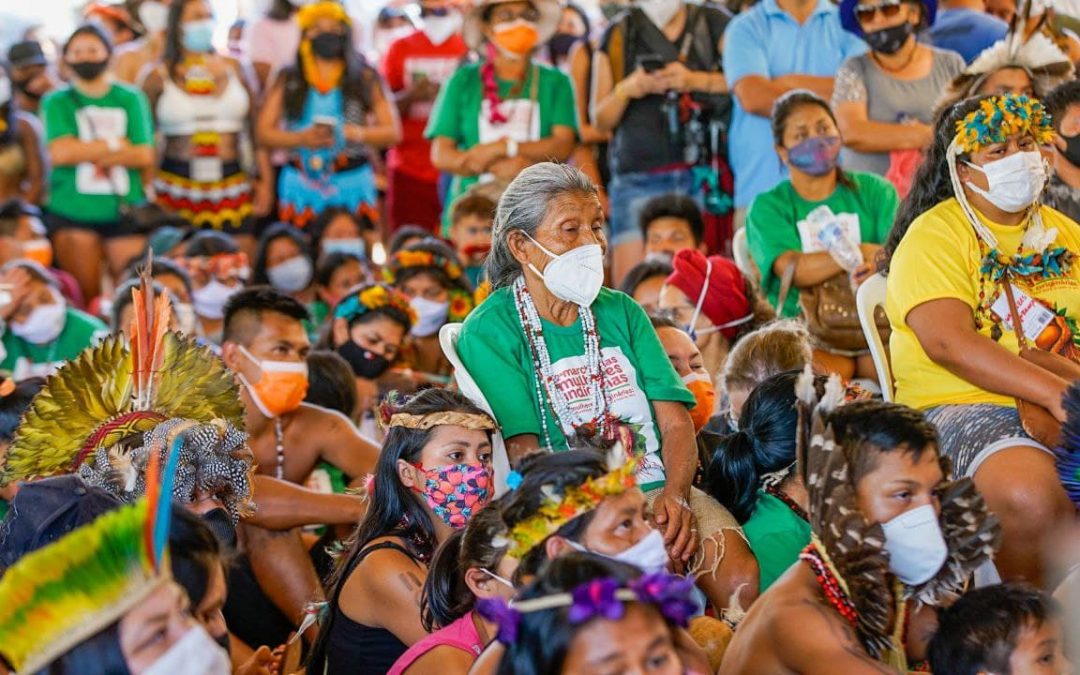
09/Sep/2021
Foto: Juliana Pesqueira
A II Marcha das Mulheres Indígenas será realizada nesta sexta-feira (10) e não mais na manhã de hoje, 9 de setembro, como estava prevista na programação da mobilização, em Brasília.
A decisão tem como objetivo garantir a vida das mulheres, anciãs, jovens e crianças presentes, na mobilização que acontece desde o dia 7 de setembro, na capital federal, com a participação de mais de 5 mil pessoas de 172 povos, de todas as regiões do país.
Grupos extremistas, fascistas, armados, muitos identificados com camisetas escrito Agro seguem invadindo a Esplanada dos Ministérios, com olhares coniventes do governo do GDF (Governo do Distrito Federal) e em apoio a Jair Bolsonaro. Em virtude disso, a Esplanada está bloqueada.
A nós interessa saber quem é o agro que financia esses criminosos? Quem são os golpistas que querem a todo custo impedir o Supremo Tribunal Federal de julgar o processo da Terra Indígena Ibirama-Laklãnõ do povo Xokleng, que marcará definitivamente a política de demarcação de terras no Brasil?
Viemos de todo o país realizar nosso encontro de mulheres, em um diálogo sobre as nossas pautas e acompanhar o que pode ser o julgamento mais importante para os direitos indígenas no país em décadas. O Marco temporal é uma aberração jurídica, elaborada por aqueles que financiam essas manifestações antidemocráticas, e que a todo custo, historicamente, tentam calar nossa voz, subjugar nossos corpos, assim como já fizeram no passado.
Todos os olhos do mundo estão voltados hoje para o Brasil, perplexos. A imprensa nacional e internacional está acompanhando a nossa mobilização, repercutindo em todo o mundo a nossa luta e o que pode acontecer.
Jamais aceitaremos que nossas mulheres e povos sejam submetidos novamente a tamanha violência! Esses capítulos são páginas de um passado, que estamos reescrevendo com a nossa luta, a partir do chão dos nossos territórios.
A II Marcha das Mulheres Indígenas sairá amanhã do nosso acampamento, para as ruas, com nossos corpos e nossas vozes ecoantes na luta por justiça, por liberdade e pela demarcação de nossas terras sagradas ancestrais.
Jamais aceitaremos o arbítrio do governo genocida. Cadeia para Bolsonaro! Fora!
Marco Temporal Não
Demarcação Já
Articulação Nacional das Mulheres Indígenas Guerreiras da Ancestralidade – ANMIGA
Articulação Nacional das Mulheres Indígenas Guerreiras da Ancestralidade – ANMIGA
Articulação dos Povos Indígenas do Brasil – APIB
Organizações regionais de base da APIB:
APOINME – Articulação dos Povos Indígenas do Nordeste, Minas Gerais e Espírito Santo
ARPIN SUDESTE – Articulação dos Povos Indígenas do Sudeste
ARPINSUL – Articulação dos Povos Indígenas do Sul
ATY GUASU – Grande Assembléia do povo Guarani
Comissão Guarani Yvyrupa
Conselho do Povo Terena
COIAB – Coordenação das Organizações Indígenas da Amazônia Brasileira
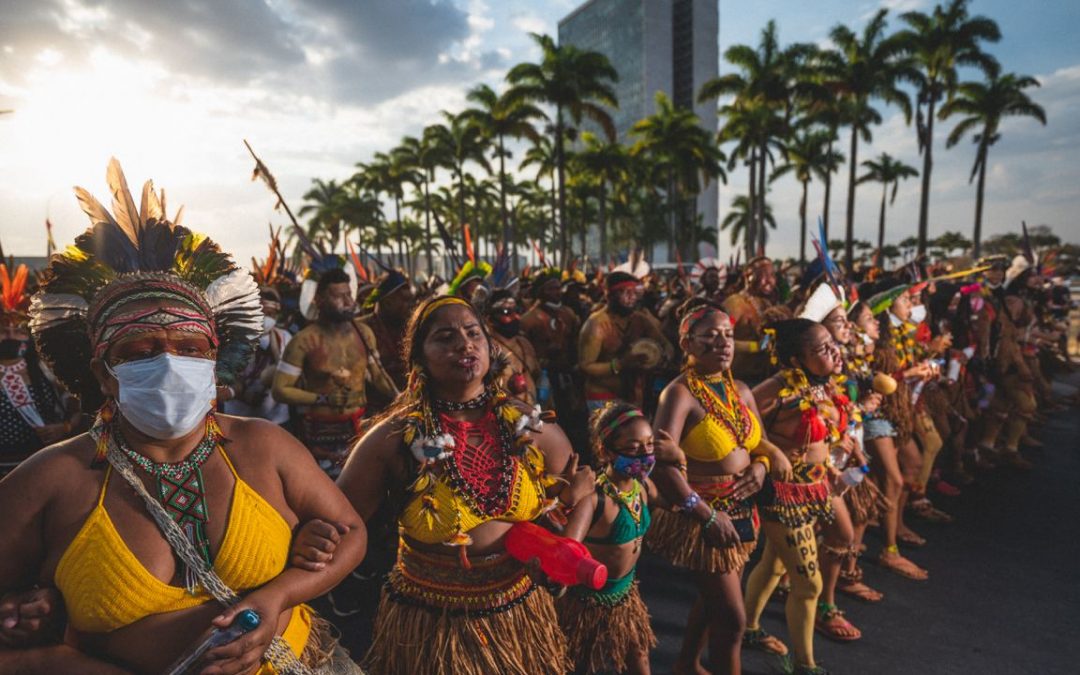
03/Sep/2021
The event will gather about 4,000 women from 150 peoples, from all regions of the country and will continue the mobilizations of the indigenous movement in defense of their rights in the federal capital
Between the 7th and 11th of September, the National Articulation of Indigenous Women Warriors of Ancestrality (Anmiga) holds the Second National March of Indigenous Women, in Brasília. With the theme “Original women: Reforesting minds for the healing of the Earth’, it is expected the participation of about 4,000 women, from more than 150 peoples, coming from all biomes of Brazil, during the 3 days of activities, which take place in the space of the National Arts Foundation (FUNARTE).
“We are seeking to guarantee our territories, those that preceded us, for present and future generations, defending the environment, this common good that guarantees our ways of life as humanity. In addition to being a mere physical resource, it is also home to the spirits of forests, animals and the waters of life as a whole, source of our ancestral knowledge”, reinforces Anmiga’s statement on the march.
The mobilization was carried out for the first time in 2019, and it took place virtually in 2020 due to the Covid-19 pandemic. The sanitary protocols of the second march reinforce all existing and recommended norms for combating coronaviruses.
According to the organization of the march, the women’s delegations were guided to prioritize the participation of people who had completed their immunization cycle against Covid-19, with at least two doses of the vaccine, or with the unique dose. The use of mask during the activities is mandatory and testing will be carried out upon the arrival of people at the event.
The march health team includes indigenous health professionals in partnership with the Brazilian Association of Collective Health (Abrasco), the Oswaldo Cruz Foundation (Fiocruz), the Indigenous Health Clinic from the University of Brasília (Asi/UNB), the Health Department of the Federal District with the University Hospital of Brasília (HUB).
Permanent Mobilization
“We state that indigenous women will be on the front line to bury once and for all the ‘milestone thesis’, during the 2nd march of indigenous women”, emphasizes the Anmiga coordination.
Since August 22, more than six thousand indigenous people, from 176 peoples, from all regions of the country, were present in Brasília, gathered in the “Luta pela Vida” camp, which is currently the largest mobilization in the history of the indigenous movement. Headed by the Articulação dos Povos Indígenas do Brasil (Apib), in association with all its regional organizations, the indigenous people are following the judgment by the Supreme Court (STF) that will define the future of the demarcation of Indigenous Lands and also protest against the anti-indigenous agenda of Bolsonaro government and within the National Congress.
After the beginning of the trial, on August 26, and the announcement that it would be resumed this Wednesday (1/09), the indigenous people decided to keep the mobilization in Brasília and in the territories. Around 1,200 indigenous leaders, representing their peoples, remained in Brasília, and the “Luta pela Vida” camp was transferred to a new location, Funarte.
The group will continue to follow the trial and join forces with the 2nd March of Indigenous Women in a proposal for permanent mobilization.
Schedule
September 7th will be dedicated to welcoming the delegations in Brasilia, with orientation and testing activities for Covid-19. The National Forum of Indigenous Women starts on Wednesday, the 8th, and the entire mobilization will follow the return of the judgment in the Supreme Court at 2 pm (GMT-3).
On Thursday (9), the March of Indigenous Women will head to the Três Poderes Square, and on the 10th the end of the mobilization activities will count on the launch of the mobilization “Reflorestarmentes”. All activities can be followed on the website: anmiga.org
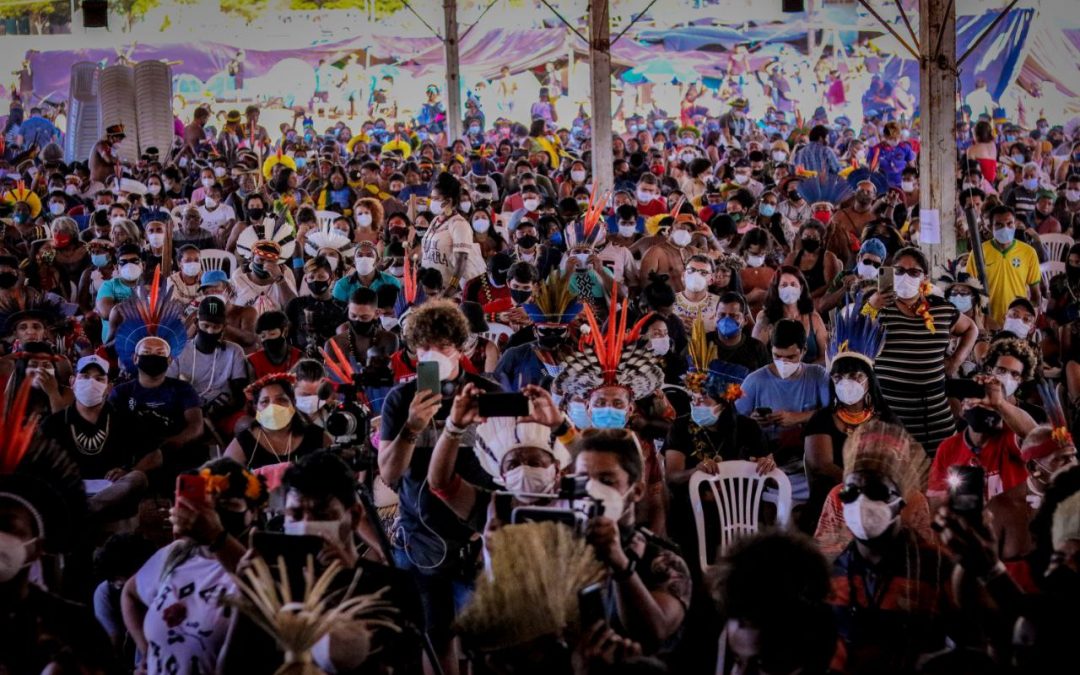
23/Aug/2021
Fotos: @scotthill / Aty Guasu
More than 5,000 indigenous people from all regions of Brazil are gathered in Brasilia to claim their rights
The second day of the Struggle for Life Camp began with the presentation of the indigenous delegations gathered in the camp. At this moment, more than 4,000 indigenous people, from 117 peoples from all regions of Brazil, are present at the Esplanada dos Ministérios, in Brasília. This morning, in a presentation of indigenous cultures, the delegations had the opportunity to exhibit their traditional dances and songs, reinforcing the cultural ancestry shared between the peoples.
In the afternoon, the coordination of Apib and its regional organizations had a moment to present their considerations on the challenges facing Indigenous Peoples across the country. The regional organizations that make up Apib are: Articulation of Indigenous Peoples of the Northeast, Minas Gerais and Espírito Santo (APOINME), Terena People’s Council, Articulation of Indigenous Peoples of the Southeast (ARPINSUDESTE), Articulation of Indigenous Peoples of the South (ARPINSUL), Great Assembly of Guarani Kaiowá Peoples (Aty Guasu), Coordination of Indigenous Organizations of the Brazilian Amazon (COIAB) and Guarani Yvyrupa Commission.
“It is also important to highlight that our camp has developed a series of health protocols, dedicated to reinforcing existing WHO norms, as all indigenous people who are in the camp must be vaccinated, obligatorily, in order to be able to accompany our camp. We feel pushed to be present in Brasilia, in this very desolate scenario that is being promoted both by the National Congress, but mainly by the Federal Government regarding the rights of indigenous peoples. From the 22nd to the 28th of August, in Brasília, we will fight for the rights of indigenous peoples, mainly guaranteeing the well-being of our territories.” Dinamam Tuxá, Coordinator of the Articulation of Indigenous Peoples of Brazil.
Indigenous Peoples of Brazil Receive International Support
The camp was visited by a Progressive International delegation, an articulation that brings together human rights organizations, political parties, unions and other institutions from the progressive field from several countries. The delegation was welcomed by representatives of the Munduruku and Kayapó peoples, who took advantage of the meeting to denounce the impacts they are facing due to infrastructure projects close to their lands.
Apib’s representatives delivered copies of the International Dossier released last week to serve as an instrument of denunciation for the international community, the document brings a series of complaints about the threats and violence perpetrated by the Government of Bolsonaro against Indigenous Peoples.
Also today, a delegation from Apib was invited to visit the Norwegian Embassy, where they were able to deliver the International Dossier and demand support for their struggle from Ambassador Nils Martin Gunneng, and from the program officer, Mr. Kristian Bengston.
United Nations reaffirms the rights of Indigenous Peoples in Brazil
Francisco Cali Tzay, UN Special Rapporteur on the rights of indigenous peoples today called on the Supreme Court (STF) to guarantee the rights of indigenous peoples to their lands and territories, and to reject a legal argument promoted by commercial agents with the aim of explore natural resources in traditional indigenous lands, referring to the Milestone thesis (tese do Marco Temporal).
“Accepting a timeframe doctrine would result in a significant denial of justice for many indigenous peoples who seek recognition of their traditional land rights. According to the Constitution, indigenous peoples have the right to permanent possession of the lands they traditionally occupy”, said Francisco. This statement reinforces the relevance and need to defend the right of Indigenous Peoples to their territories.
Plenary of the Five Powers
At 3 pm, the Plenary of the Five Powers will take place, which will be held to promote an analysis of the situation on the legislative, executive, judiciary, popular and spiritual powers. In the evening, the Indigenous Peoples will be gathered to celebrate a Pajelança: a religious ritual to reinforce the alliance of the Peoples. After the ceremony, Mídia Índia (@midiaindia) will exhibit the video screening: “Memory and Fight”.
“This plenary talks about the five powers and is very important within the Struggle for Life camp, giving it a great meaning because it passes through the discussion of the legislature, the judiciary and the executive, and it also reminds us of the fourth power, which are the masses, which is the people, the Brazilian nation as a whole, not only the indigenous peoples, but the Brazilian people, which is the fourth power. And then we talk of the fifth power, being the spiritual one. The divinities rules our lives, rules the communities, gives strength in times of difficulty and in the face of invasion, miners, loggers, against bills and ordinances, against all human ailments and spiritual, also against the pandemic and the diseases” Marcos Sabaru, Assessor policy of Apib.
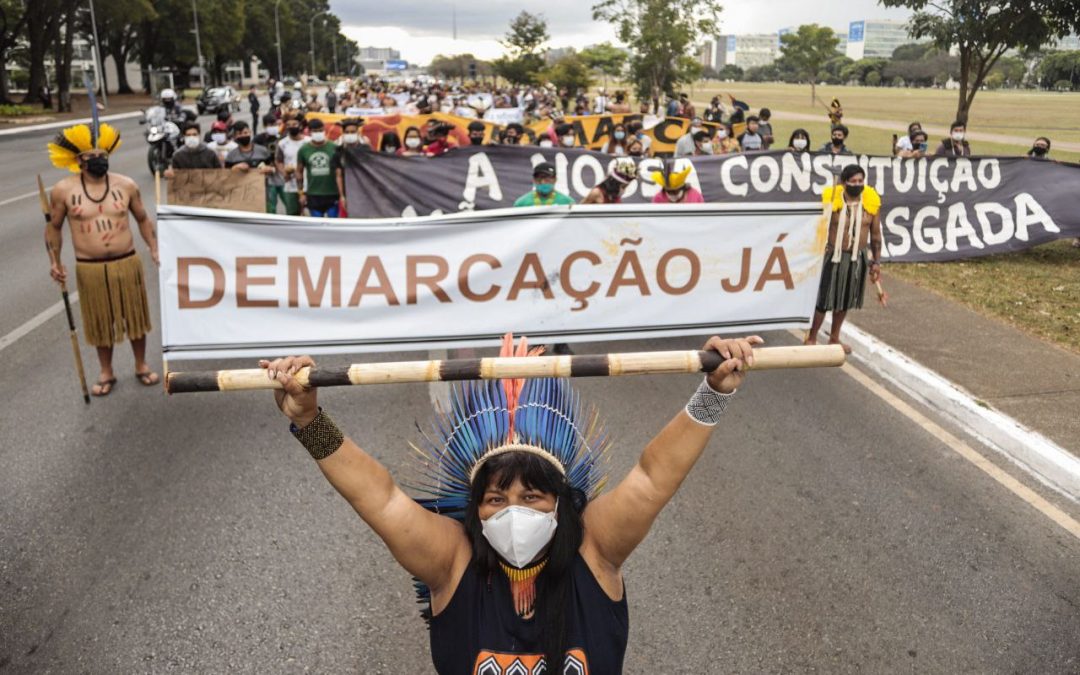
20/Aug/2021
Mobilization calls for indigenous people already vaccinated and counts with health protocols against Covid-19, in Brasilia
The Articulation of Indigenous Peoples of Brazil (Apib), associated with all its regional organizations, inaugurates this Sunday (22) the national mobilization ‘Struggle for Life’, in Brasília. The activities, which will last until the 28th of August, intend to defend the indigenous peoples rights and to promote activities against the anti-indigenous agenda that advances into the National Congress and the Federal Government. The mobilization will also focus on the trial about the Milestone Thesis (Marco Temporal) by the Brazilian Supreme Court (STF), which is expected to be resumed on August 25th and may define the future for indigenous land demarcation.
The indigenous movement constantly denounces the increase of violence against indigenous peoples inside and outside their traditional territories. Apib and all its regional grassroot organizations disseminate this information to the press, on social media and formalized complaints in national and international legal instances. On the date that marks the International Day of Indigenous Peoples, August 9, Apib presented an unprecedented statement before the International Criminal Court (ICC) to denounce Bolsonaro’s government on the crimes of Genocide and Ecocide.
“We cannot remain silent while facing this violent scenario. It is not only Covid19 virus that is killing our people and that is why we decided once again to go to Brasília to continue fighting for the lives of indigenous peoples, for the Mother Earth and for the future of humanity”, emphasizes Sonia Guajajara, one of Apib’s executive coordinators.
The mobilisation previews seven days of activities in the federal capital, with an intense schedule of plenary sessions, political audiences within Federal Government bodies and embassies, marches and public demonstrations. During this period, indigenous people from all regions of Brazil will be camped at Praça da Cidadania.
The camp will have an intense program of political discussions and cultural events. All activities have a collaborative communication team formed mostly by indigenous people. “It is necessary to give visibility and amplify the voices of the indigenous movement as a whole. In this scenario of many threats, communication plays a key role and we will be joining forces in this camp”, emphasizes Erisvan Guajajara, Media India coordinator.
Health care
The Struggle for Life Camp has developed sanitary protocols dedicated to reinforcing all existing and recommended norms for combating Covid19. The camp’s health team includes indigenous professionals and count on the support of the Brazilian Association of Collective Health (Abrasco), the Oswaldo Cruz Foundation, the Indigenous Health Clinic of the University of Brasília (Asi/UNB) and the University Hospital of Brasília (HUB).
“The health recommendations begin from the moment the delegations organize themselves to leave their territories. Apib proposes the invitation of people who already have their full vaccination coverage,” explains Dinamam Tuxá, one of Apib’s executive coordinators.
The first day of the camp (22) is dedicated to the arrival of the delegations and to carry out mass testing for Covid-19 as one of the sanitary protocols for the mobilization.
On Monday (23) the activities are dedicated to political updates with leaders across the country. ‘The Five Powers’ is the name of the plenary that will be held to promote an analysis of the current situation on the legislative, executive, judiciary, popular and spiritual powers. On this day, rituals and audiovisual exhibitions are also planned.
Future
The most central agenda of the Struggle for Life mobilisation is related to the trial by the Brazilian Supreme Federal Court (STF), which is expected to be the most important process of the century for the lives of indigenous peoples. The Court will analyze the repossession action filed by the government of Santa Catarina against the Xokleng people, referring to the Ibirama-Laklãnõ Indigenous Land (TI), where the Guarani and Kaingang peoples also live.
Under the status of “general repercussion”, the final decision made by the trial will serve as a guideline for the federal government and all instances of Brazilian justice system, as well as a reference to all processes, administrative procedures and legislative projects regarding the indigenous land demarcation procedures.
“Indigenous peoples experience a deeply adverse political context under Bolsonaro’s administration, the first president elected with a declared position against the indigenous peoples. As soon as he started his government, he signed several acts that hurt the Constitution and International Treaties that protect indigenous communities and their territories. It is important to note that, in this context of pandemic, it is essential to reflect on the relevant role the traditional territories play to keep humanity’s equilibrium. So, the indigenous lands, besides protecting the indigenous peoples’s ways of life, are a national and public heritage, which contributes to keep the climatic balance”, emphasizes Eloy Terena, Apib’s juridic coordinator in his article on the Supreme Court judgment (read the full text here)
In this sense, the schedule for the Struggle for Life camp on August 24th and 25th is dedicated to discussions, acts and manifestations related to the trial, in support of the Supreme Court justices and against the Milestone Thesis (Marco Temporal).
The days following the trial will give space to debates related to the 2022 elections and the strengthening of the support networks for the struggles of indigenous peoples. The departure of all delegations is scheduled for the 28th of August.
Check out some schedule details here
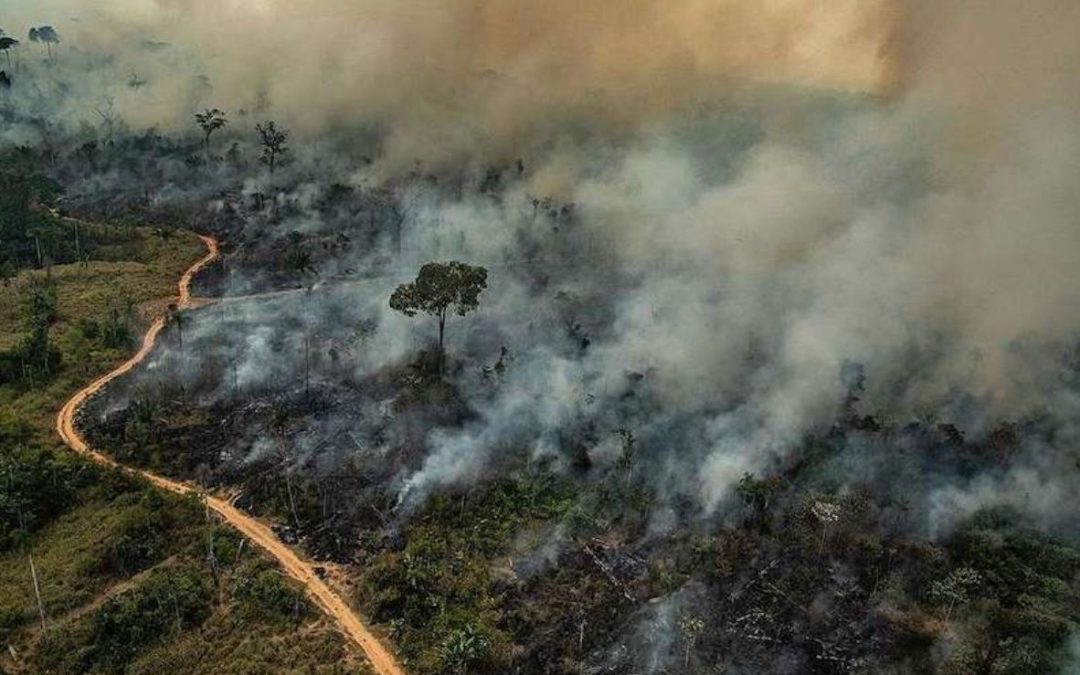
19/Aug/2021
Bills being processed in the Brazilian Congress, with irreversible consequences to the Amazon forest and indigenous peoples, could bring serious risks to the operations of financial institutions. An alert from the Coalition and other partners adds to the agenda of denunciations by indigenous peoples.
Brasília, August 19, 2021 – In a letter sent today to 80 international and Brazilian financial institutions, Forest & Finance Coalition, together with the Association of Indigenous People of Brazil (APIB), the Climate Observatory, and 45 allied organizations, warn about the risks of investments in Brazil in light of a suite of legislative changes being currently pushed in the Brazilian Congress. If approved, these bills will result in irreversible consequences for the protection of critical ecosystems such as the Amazon rainforest and the guarantee of the rights of Indigenous peoples, posing serious risks for many financial institutions operating in Brazil.
The coalition’s alert aims to pressure these financial institutions to publicly and forcefully position themselves against this regressive agenda, spur change within the industry and warn companies that operate in Brazil and rely on their financing.
“The Forests and Finance Coalition has been pressuring financial institutions for some time to take action in relation to their investments that threaten forests and the rights of Indigenous peoples in Brazil. These measures include clear criteria for excluding companies that commit these violations from its portfolio and the adoption of policies against deforestation and for the protection of the rights of Indigenous peoples,” says Merel Van der Merk, coordinator of the Coalition. “But faced with a threat of this magnitude to the legal protection of the environment, we need concrete action now, a very clear position that these institutions will not be accomplices in further destruction, deforestation and degradation of Brazilian ecosystems and the violation of rights of indigenous peoples,” she highlighted.
Among the legislative threats described in the letter are Bill 2633/2020, also known as the Land Grabbing Bill (PL da Grilagem); Bill 3729/2004, which loosens the rules for environmental licensing in Brazil – both approved by a great majority in the Chamber of Deputies, awaiting consideration in the Senate; Bill 191/2020 which frees up mining and other extractive activities within Indigenous lands and removes the veto power of these communities; Legislative Decree 177/2021, which allows Brazil’s withdrawal from Convention 169 of the ILO; and Bill 490/2007, which may revert constitutional protections to Indigenous Territories, making new demarcations unfeasible and threatening the ones already in place.
The letter reinforces the agenda of mobilizations by Indigenous peoples and organizations between the months of August and September in Brazil. On Monday, August 16t, the Association of Brazil’s Indigenous Peoples (APIB) published an international dossier of complaints to draw attention to the offensive against Indigenous peoples and the environment led by the Bolsonaro government and its allies. APIB signed the letter led by the coalition, in addition to 45 other organizations.
“With this letter, we join hundreds of Indigenous leaders and environmental advocates that are now marching to Brasília to defend their territories and forests. If approved, these measures will have catastrophic results not only for Indigenous people but to the entire social and environmental protection apparatus in Brazil – which is already dismantled by the current administration – and because of the rainforest’s role in our climate, for the world,” said Rosana Miranda, campaign adviser at Amazon Watch, member of the coalition. “These changes threaten the financial sector itself, as it represents an increase in the social, legal, environmental, and climate risks involved in operating in Brazil. They need to act,” she concluded.
About the Forests and Finance Coalition
The Forests & Finance (F&F) is an initiative of a coalition of campaign and research organizations including Rainforest Action Network, TuK Indonesia, Profundo, Amazon Watch, Reporter Brasil, BankTrack, Sahabat Alam Malaysia, and Friends of the Earth US. The coalition seeks to prevent financial institutions from facilitating the common environmental and social abuses of forest risk commodities. They advocate greater transparency, specific financial sector policies, systems, and regulations.
The initiative’s database can uncover the links between major banks, investors, and companies at risk of deforestation, and present case studies involving deforestation and human rights violations linked to bank investments and financing. Financial institutions can access more than 300 companies directly involved in the supply chains of various commodities whose operations affect tropical forests in Southeast Asia, Central and West Africa, and Brazil.
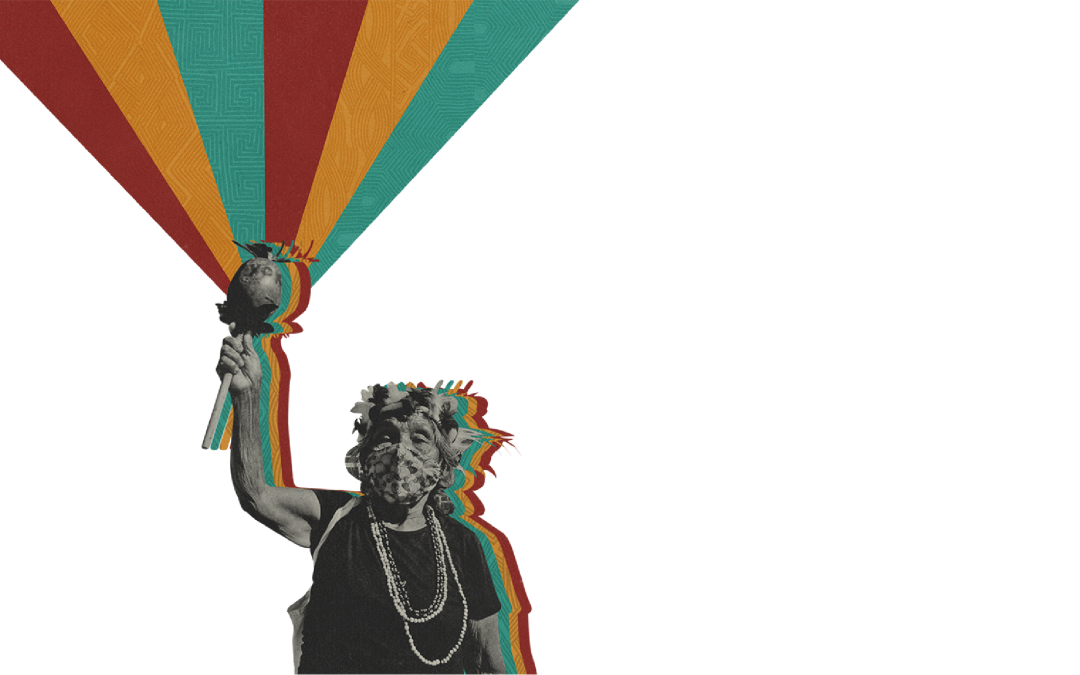
19/Jul/2021
For the last 521 years this land has been characterized by violations, racism and genocide. Centuries of attempts to subjugating peoples, cultures and territories. Today there are not only guns tearing at bodies, but also pens signing extermination laws. When not only criminals are directly attacking, governments skip away from their duty of protecting our peoples. And as much as the fights overlap, we won’t allow it!
We are the first ones in this land, before even Brazil becomes Brazil.
Against bills that violate the Constitution itself, we will continue to be mobilized in the federal capital, sounding our maracas and singing our songs, between the 22nd and 28th of August.
We make this call, even during the pandemic, because we cannot remain silent facing genocide and echocide, because the Earth screams even when we are quiet. May the country listen to its native peoples. Our lives are linked to the earth, as we live in communion with it. We are the guardians of the forests and all forms of life that there inhabit. Facing a Congress that advances in an anti-indigenous agenda and against the Temporal Framework, scheduled to be voted by the Supreme Court on August 25th, we will resist!
We will lead vaccinated to Brasília, with all the hygiene precautions against Covid-19, to play our maracas to guarantee the rights of indigenous peoples.
Come together, relatives, to STRUGGLE FOR LIFE Camp.
Support
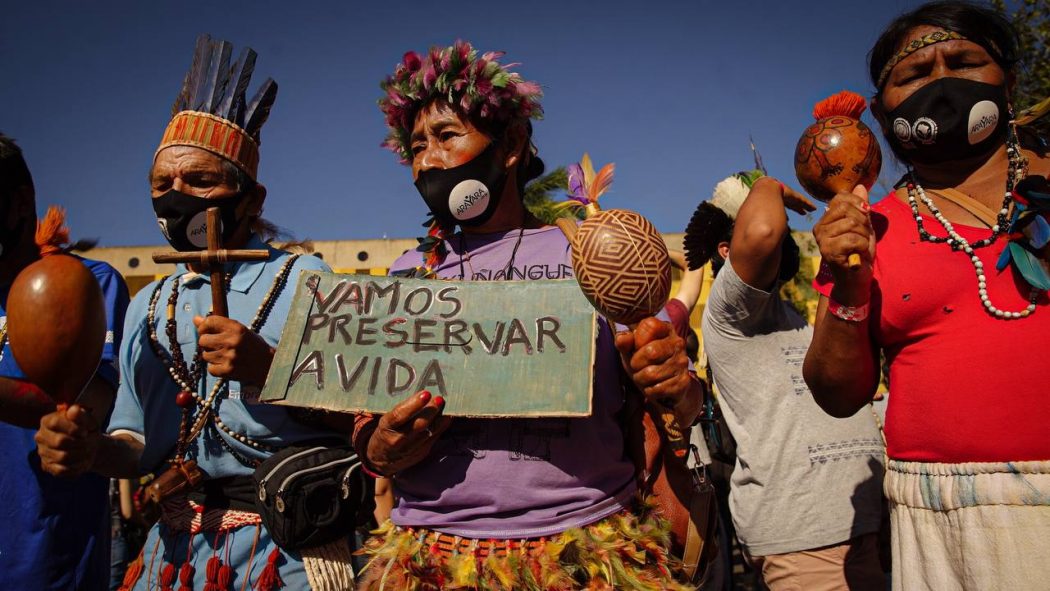
16/Jul/2021
The appeal was made in the same week Brazil was mentioned due risk of atrocity against indigenous peoples; Brazilian government tried to present a counter-argument, denied by the UN organism
By Adi Spezia and Tiago Miotto, Cimi’s Communication Department
In a joint statement during the 14th Session of the UN Mechanism of Experts on the Rights of Indigenous Peoples (EMRIP), the Articulation of Indigenous People from Brazil (Apib) and the Indigenous Missionary Council (Cimi) denounced this Wednesday (14) measures adopted by the Brazilian government and by the National Congress that attack the rights of indigenous peoples in Brazil, such as 490 Bill, which in practice makes unfeasible new demarcations of indigenous lands, and the thesis of the temporal framework.
The meeting, which aims to listen to indigenous peoples and their organizations, was held virtually in this edition, due to the pandemic. It had as its central issue the self-determination of peoples and the rights of indigenous children. The EMRIP is a unique mechanism whose members are exclusively indigenous peoples. “It is a very important mechanism for the world’s indigenous community, led by indigenous peoples,” explains Paulo Lugon Arantes, Cimi’s international advisor.
Arantes, speaking on behalf of both organizations, highlighted the seriousness of the temporal frame and of the more than 30 other bills pending in the Brazilian Congress that violate the right of free determination from native peoples. The 490 Bill, recently approved by the Commission for the Constitution and Justice (CCJ) from the Chamber of Deputies, was highlighted as one of the main threats to indigenous rights today.
“The time frame is disastrous because it will leave an incalculable mark of exclusion and marginalization over peoples who have not yet had their territories demarcated or who have been expelled from their traditional territories”, said Paulo.
The organizations also denounced the Brazilian government’s anti-indigenous agenda, which led the UN Special Advisor for the Prevention of Genocide, Wairimu Nderitu, to express an unprecedented concern with the situation of indigenous peoples in Brazil.
“President Bolsonaro has a clearly anti-indigenous agenda, which led the UN advisor for the prevention of genocide to include Brazil in the World Atrocity Map”, said the advisor, on behalf of Apib and Cimi.
Reply denied
After the joint statement, the representative from Brazilian government asked for “the right to reply”, due to the fact that the country was mentioned. The response was denied by the EMRIP secretariat, who replied that Governments have no right to respond before the mechanism. “The members of the EMRIP are the only members of the mechanism and all others are observers,” explained the secretary.










